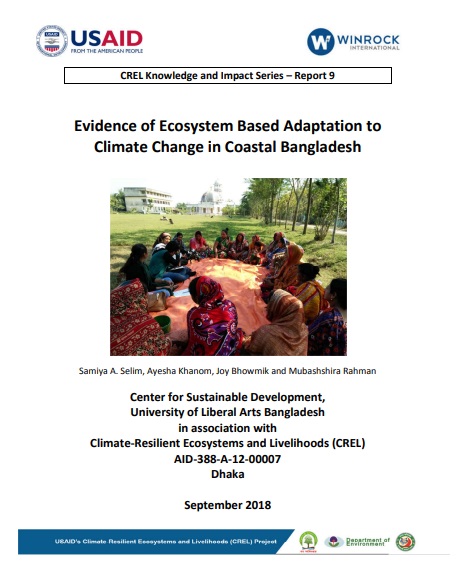🌿 COP 30 - Building a Greener Tomorrow
The 30th UN Climate Change Conference (COP 30) is taking place in Belém, Brazil. Stay informed about global climate actions, negotiations, and live sessions from 10 – 21 November 2025.
Get Updates
Evidence of Ecosystem Based Adaptation to Climate Change in Coastal Bangladesh

Files
Date
January, 2024Author(s)
- Samiya A. Selim
- Ayesha Khanom
- Joy Bhowmik
- Mubashshira Rahman
Abstract
The Bay of Bengal is among the most climate change affected regions, with massive salinity intrusion, river erosion, increasingly frequent extreme weather events. Bangladesh is considered to be one of the countries most vulnerable to climate change because of its flat and low lying topography, funnel shaped coastline challenged by its high population density. This is exacerbated by high levels of poverty and reliance of various livelihoods on climate sensitive sectors including agriculture, fisheries and water resources. To tackle some of these issues, the Climate-Resilient Ecosystems and Livelihoods (CREL) project implemented by Winrock International and funded by USAID is designed to scale up and adapt successful co-management models to conserve ecosystems and protected areas (PAs) in Bangladesh, improve governance of natural resources and biodiversity, and increase resilience to climate change through improved planning and livelihoods diversification. Whilst there are CREL sites all across the country, this study evaluated CREL project based in coastal Bangladesh. This study aimed to gather evidence to address gaps in ecosystem based adaptation (EbA) to climate change so that this can be fed into policy and management of effective implementation of EbA measures. It does this by evaluation of a number of CREL project activities based in the coastal areas of Bangladesh. The evaluation was done through primary and secondary data analysis. Firstly secondary data provided by CREL was analyzed from four CREL sites (three entirely mangrove forest sites and one coastal island site with mixed ecosystems of mangroves and intertidal mudflats), and seeing how well they aligned with and fit into the EbA framework and strategy. The second part consisted of primary data collection, in the form of focus group discussions and interviews in three sites, and seeing how beneficiaries of the project perceived project activities and how well these fit EbA interventions. Results showed that several CREL activities met EbA criteria and utilized an ecosystem approach in diversifying alternate livelihoods to deal with the negative impacts of climate change. Some of these included poultry rearing, aquaculture and knitting. The project was also focused around natural resource management, and helped with knowledge generation and awareness of sustainable harvest, minimizing environmental impact, and protection of forests and wildlife. However in some areas, we found lack of adoption of an ecosystem based approach, where the villagers are able to earn livelihood but still suffer from freshwater shortage and flooding due to poor roads. There were also several other limiting factors such as lack of land, education, power struggle, poor governance and lack of innovation that limited adoption of ecosystem based adaptation. Overall, the findings from this study show that ecosystem based adaptation is prevalent in CREL activities but there are other factors that need to be taken into consideration for successful implementation of EbA in rural areas of Bangladesh. Limitations to adopting EbA strategies as seen in this study include: lack of land, assets and finances for vulnerable people to invest in adaptation strategies, land use conflict and community opposition. There were also knowledge gaps on innovations and technologies that can be used in implementing EbA. From our study we identified the following key issues that need to be addressed when designing future projects in remote areas of Bangladesh where a majority of people are poor and have limited resources: • Addressing social and political issues e.g. land rights, power struggle, weak local governance. • Focusing on transformation to sustainability, and enabling innovation in design and adaptation mechanisms. • Social energy for collaborative ecosystem-based aquaculture and agriculture development with the poor
Citation
Selim, S.A., Khanom, A., Bhowmik, J. and Rahman, M. (2018). Evidence of Ecosystem Based Adaptation to Climate Change in Coastal Bangladesh. CREL Technical Report No. 9. Climate-Resilient Ecosystems and Livelihoods (CREL) Project, Dhaka, Bangladesh. This publication is made possible by the generous support of the American people through the United States Agency for International Development (USAID). The contents of this document do not necessarily reflect the views of the USAID or the United States Government.
Publisher
Winrock International
Rights Holder
Winrock International
URI
https://knowledgehub.pksf.org.bd/collections/UzVzOVhaMGRXSnludXhaZ3pEWnpFdz09
